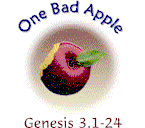 | 3.1 - Who tempts the woman? (See inset box inside.) |
 | 3.2-3 - Carefully compare what the woman says here to God's command in 2.16-17. What is
different about what the woman says? |
 | Think of pictures you have seen of this temptation story. Now carefully read 3.6. Who
was also there? |
 | Note that "sin" is never mentioned in this chapter. (The first instance is
4.7.) |
 | 3.11-13 - Note well: Who does the man blame? Who does the woman blame? |
 | 3.14-15 - One reading of this story serves to explain why a snake crawls and why there
is a natural hatred between humans and snakes. Verse 15, however, holds additional meaning
if we understand the serpent to be Satan or the force of evil which opposes God. Though it
is not explained in the New Testament, some early Christians did see in verse 15 a
prophecy of Christ and his triumph over Satan. In this reading, Christ is the
"offspring" (cf. Galatians 3:16) who will crush the head (i.e., destroy) of the
snake/Satan though the snake/Satan will bruise his heal (i.e, the crucifixion). |
 | 3.24 - Cherubim: fearsome angelic guardians, sometimes pictured as half-human, half-lion
winged creatures (cf. Ezekiel 41.18-19) |

![]()
 LESSON 3
LESSON 3![]()
![]()
![]()
![]()
![]()